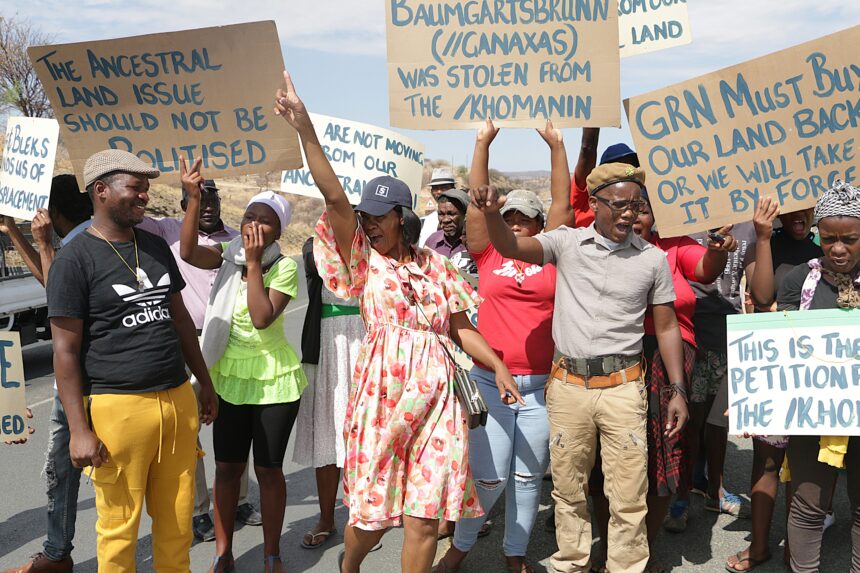Lahja Nashuuta
President Nangolo Mbumba has invited representatives of the /Khomanin people to State House to hear their plight around a contentious land issue.
Minister in the Presidency Christine /Hoebes sent out the invitation.
Last week, the community staged a peaceful protest with the intention of handing over a petition to Mbumba, through //Hoebes.
Unfortunately, the handover did not take place as she was not available.
In the letter addressed to /Khomanin land and social justice activist Shaun Gariseb,
//Hoebes wrote: “I wish to extend an invitation to you and your delegation of not more than five people to a meeting on Tuesday, 12 November 2024 at 14h00 at State House”.
Welcoming the invitation, Gariseb described it as the right opportunity for the two parties to meet face-to-face to discuss the matter.
“This is a fantastic opportunity in that the Office of the President is the last most important avenue we decided to explore for the last time as a community. Hence, we call this the very last petition.
The next cause of action, to present our case to the United Nations, is on the cards. But the executive arm of the State can be a maker or breaker in this long-standing concern of the
/Khomanin.
There are more than 10 petitions from over 14 years, resolutions from a land conference. We are optimistic that the Presidency can sort this out within 48 hours if they take our plight seriously,” the optimistic activist said.
Demands
The /Khomanin recently wrote to the government, demanding to be declared “internally-displaced persons”, as well as being classified as a marginalised community with full entitlements and benefits attached to the plight of the San community.
Last week, the group staged a peaceful protest over what they termed “landlessness, systemic ancestral land dispossession, and an unduly restrictive resettlement programme in Namibia”.
“The landlessness of the /Khomanin communities in their classifications needs to be supported with a baseline study, and we will appreciate if the government, in partnership with the /Khomanin Landless Association, commissions a baseline study for this purpose with the assistance of the Ancestral Land Foundation of Namibia,” the petition reads.
The community further maintained that they need more than 70 000 hectares of land both in the Khomas and Hardap regions to address their landlessness.
This process, they said, can be gradually undertaken after the baseline study in determining the real land needs of the /Khomanin.
“There ought to be direct engagement with the purported landowner of Baumgartsbrunn/Ganaxas in relation to his ill-deeds in destroying ancestral graves, and how he obtained waivers over our land.
A moratorium must also be placed on resettlement in the Khomas, Erongo and Hardap regions until the plight of the /Khomanin is addressed,” the petition read.
Moratorium
The /Khomanin is furthermore calling for a moratorium on the entire land reform programme in areas where there are genuine ancestral land rights claims.
In addition, the community is demanding clarity around two resettlement farms bought by the government for the resettlement of the /Khomanin, failure which will force them to occupy the land forcefully.
Also, the /Khomanin are appealing to the City of Windhoek to “decolonise and rename” the dozens of statues and street names which display colonial relics.
Among the disputed names are that of Daan Viljoen, a prominent military colonial officer and former South African administrator who presided over the removal of the Damara people from central Namibia, pushing them to Okakarara, Otjimbingwe, Okombahe and Sorris-Sorris, among other areas zoned as Damaraland.
“We strongly believe the continued public display of colonial iconography, which glorifies individuals responsible for the brutalisation, subjugation and humiliation of colonised peoples of Namibia and the /Khomanin, is a slap in the face of many Namibians,” said Verona Kharuxas, another protestor.


